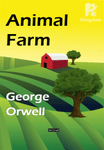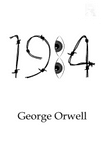15 books
-
1. 1984
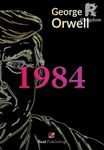
1984 Nineteen Eighty-Four: A Novel, often published as 1984, is a dystopian novel by English novelist George Orwell. It was published in June 1949 by Secker & Warburg as Orwell's ninth and final book completed in his lifetime. The story was mostly written at Barnhill, a farmhouse on the Scottish island of Jura, at times while Orwell suffered from severe tuberculosis. Thematically, Nineteen Eighty-Four centers on the consequences of government over-reach, totalitarianism, and repressive regimentation of all persons and behaviors within society.
-
2. Animal Farm
(pub.1945) Webmaster's Note, 5/10/2007 - We have been informed by the rights holder that this work is still copyrighted in our territory. So we have removed it. You may still read our original summary though to the left. This is an allegorical dystopian novel by George Orwell, published in England on 17 August 1945. According to Orwell, the book reflects events leading up to the Russian Revolution of 1917 and then on into the Stalin era in the Soviet Union. Orwell, a democratic socialist, was a critic of Joseph Stalin and hostile to Moscow-directed Stalinism, an attitude that was critically shaped by his experiences during the Spanish Civil War. The Soviet Union, he believed, had become a brutal dictatorship, built upon a cult of personality and enforced by a reign of terror. In a letter to Yvonne Davet, Orwell described Animal Farm as a satirical tale against Stalin ("un conte satirique contre Staline"), and in his essay "Why I Write" (1946), he wrote that Animal Farm was the first book in which he had tried, with full consciousness of what he was doing, "to fuse political purpose and artistic purpose into one whole". Time magazine chose this book as one of the 100 best English-language novels (1923 to 2005); it also featured at number 31 on the Modern Library List of Best 20th-Century Novels. It won a Retrospective Hugo Award in 1996, and is also included in the Great Books of the Western World selection. Plot summary: Old Major, the old boar on the Manor Farm, summons the animals on the farm together for a meeting, during which he refers to humans as parasites and teaches the animals a revolutionary song called Beasts of England. When Major dies, two young pigs, Snowball and Napoleon, assume command and consider it a duty to prepare for the Rebellion. The animals revolt and drive the drunken and irresponsible farmer Mr. Jones from the farm, renaming it "Animal Farm". They adopt Seven Commandments of Animalism, the most important of which is, "All animals are equal." Snowball teaches the animals to read and write, while Napoleon educates young puppies on the principles of Animalism. Food is plentiful, and the farm runs smoothly. The pigs elevate themselves to positions of leadership and set aside special food items, ostensibly for their personal health. Napoleon and Snowball struggle for preeminence. When Snowball announces his plans to build a windmill, Napoleon has his dogs chase Snowball away and subsequently declares himself leader of Animal Farm. ALL ANIMALS ARE EQUAL, BUT SOME ANIMALS ARE MORE EQUAL THAN OTHERS. When the animals take over the farm, they think it is the start of a better life. Their dreams is of a world where all animals are equal and all property is shared. But soon the pigs take control and one of them, Napoleon, becomes the leader of all the animals. One by one the principles of the revolution are abandoned, until the animals have even less freedom than before.--Submitted by Anonymous. Animal Farm is a classic work by George Orwell and a noted piece of literature, which, of course, may help the reader to catapult the imagination beyond the horizons of dogmatic adherence to idealistic or Utopian thoughts. It however, represents human characteristics in an analogy of animal instincts, but it really gives insight into the Russian Revolution of 1917. It also mimics the doomsday of a precipitated change, brought by a modicum of bureaucratic class called as Bolsheviks.--Submitted by Rahimullah Baig Hunzai In this book, written in 1943 and 1944 while Orwell was working as a journalist and commentator for (among others) the BBC Orwell vents his profound disdain for Stalinism and his disappointment with Marxism as political praxis. A particularly English brand of Socialist with a towering social conscience Orwell himself not only campaigned on behalf of the ILP but had the courage of his convictions to join the Poum in the fight against fascism in Spain in 1937. However, disappointed and endangered by the political machinations of Stalin's Russia in Spain and disgusted by the Molotov Ribbentrop non aggression pact of 1939 and early communist rhetoric against involvement in World War II as a capitalist war, Orwell turns his not inconsiderable facility for satire against totalitarian socialism. Not so much against the Bolshevik revolution of 1917 but against the hypocrisy, the repressiveness that that revolution descended into from the threat of Lenin. This is one of the best books in the English Language written by one of the most viscerally intelligent and humane geniuses of the pen to have lived. It comes highly recommended.--Submitted by Anonymous ALL humans ARE EQUAL, BUT SOME humans ARE MORE EQUAL THAN OTHERS. This is what happens in many country nowadays.--Submitted by Anonymous
-
3. Animal Farm. A Fairy Story
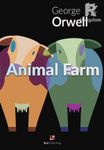
Animal Farm is an allegorical novel by George Orwell, first published in England on 17 August 1945. The book tells the story of a group of farm animals who rebel against their human farmer, hoping to create a society where the animals can be equal, free, and happy. Ultimately, however, the rebellion is betrayed and the farm ends up in a state as bad as it was before, under the dictatorship of a pig named Napoleon. According to Orwell, the fable reflects events leading up to the Russian Revolution of 1917 and then on into the Stalinist era of the Soviet Union.Orwell, a democratic socialist, was a critic of Joseph Stalin and hostile to Moscow-directed Stalinism, an attitude that was critically shaped by his experiences during the Spanish Civil War. The Soviet Union, he believed, had become a brutal dictatorship, built upon a cult of personality and enforced by a reign of terror. In a letter to Yvonne Davet, Orwell described Animal Farm as a satirical tale against Stalin ("un conte satirique contre Staline"),and in his essay "Why I Write" (1946), wrote that Animal Farm was the first book in which he tried, with full consciousness of what he was doing, "to fuse political purpose and artistic purpose into one whole"
-
4. Nineteen Eighty Four
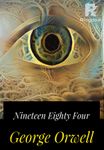
Nineteen Eighty Four by George Orwell. Orwell’s brilliantly bleak future vision of totalitarianism is arguably the greatest of all literary dystopias. Both in its impeccably realised world-building and the prophetic nature of its many ideological concepts, Nineteen Eighty-Four contrived to look back to the Stalinist purges of the 1930s whilst simultaneously predicting with uncanny accuracy the worst excesses of the Cold War-era Soviet Union. A textbook example of a novel you really must read.
-
5. Burmese Days
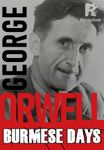
Burmese Days is the first novel by English writer George Orwell, published in 1934. Set in British Burma during the waning days of Empire, when Burma was ruled from Delhi as part of British India, it is ”a portrait of the dark side of the British Raj.” At the centre of the novel is John Flory, ”the lone and lacking individual trapped within a bigger system that is undermining the better side of human nature.” The novel describes ”both indigenous corruption and imperial bigotry” in a society where, ”after all, natives were natives—interesting, no doubt, but finally...an inferior people.” Burmese Days was first published ”further afield,” in the United States, because of concerns that it might be potentially libelous; that the real provincial town of Katha had been described too realistically; and that some of its fictional characters were based too closely on identifiable people. A British edition, with altered names, appeared a year later. Nonetheless, Orwell’s harsh portrayal of colonial society was felt by ”some old Burma hands” to have ”rather let the side down”. In a letter from 1946, Orwell wrote, ”I dare say it’s unfair in some ways and inaccurate in some details, but much of it is simply reporting what I have seen”.
-
6. 1984
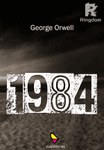
Nel 1984 la Terra è divisa in tre grandi potenze totalitarie: Oceania, Eurasia ed Estasia, impegnate in una perenne guerra tra loro, il cui scopo principale è mantenere il controllo totale sulla società. In Oceania, la sede dei vari ministeri (Ministero della Pace, che presiede alla guerra, dell'Amore, che presiede alla sicurezza, della Verità, che presiede alla propaganda e al revisionismo storico, e dell'Abbondanza, che presiede all'economia) è Londra, facente parte della provincia di Pista Uno.La società è amministrata secondo i principi del Socing (nell'originale inglese, "IngSoc"), il Partito Socialista Inglese, ed è governata da un onnipotente partito unico con a capo il Grande Fratello (dall'inglese "Big Brother" che letteralmente significa "Fratello maggiore"[, successivamente italianizzato in "Grande Fratello"), un personaggio che nessuno ha mai visto di persona (ma che appare in manifesti affissi dappertutto) e che tiene costantemente sotto controllo la vita di tutti i cittadini.
-
7. A Clergyman’s Daughter

A Clergyman's Daughter is a 1935 novel by English author George Orwell. It tells the story of Dorothy Hare, the clergyman's daughter of the title, whose life is turned upside down when she suffers an attack of amnesia. It is Orwell's most formally experimental novel, featuring a chapter written entirely in dramatic form, but he was never satisfied with it and he left instructions that after his death it was not to be reprinted. Despite these instructions, Orwell did consent that to cheap editions "of any book which may bring in a few pounds for my heirs" following his death.
-
9. 1984

L’histoire se passe à Londres en 1984, comme l'indique le titre du roman. Le monde, depuis les grandes guerres nucléaires des années 1950, est divisé en trois grands « blocs » : l’Océania (Amériques, îles de l'Atlantique, comprenant notamment les îles Anglo-Celtes, Océanie et Afrique australe), l’Eurasia (reste de l'Europe et URSS) et l’Estasia (Chine et ses contrées méridionales, îles du Japon, et une portion importante mais variable de la Mongolie, de la Mandchourie, de l'Inde et du Tibet6) qui sont en guerre perpétuelle les uns contre les autres. Ces trois grandes puissances sont dirigées par différents régimes totalitaires revendiqués comme tels, et s'appuyant sur des idéologies nommées différemment mais fondamentalement similaires : l’Angsoc (ou « socialisme anglais ») pour l'Océania, le « néo-bolchévisme » pour l'Eurasia et le « culte de la mort » (ou « oblitération du moi ») pour l'Estasia. Tous ces partis sont présentés comme communistes avant leur montée au pouvoir, jusqu'à ce qu'ils deviennent des régimes totalitaires et relèguent les prolétaires qu'ils prétendaient défendre au bas de la pyramide sociale. Les trois régimes sont présentés comme étant socialement, économiquement et idéologiquement sensiblement les mêmes.À côté de ces trois blocs subsiste une sorte de « quart-monde », dont le territoire ressemble approximativement à un parallélogramme ayant pour sommets Tanger, Brazzaville, Darwin et Hong Kong. C'est le contrôle de ce territoire, ainsi que celui de l'Antarctique, qui justifie officiellement la guerre perpétuelle entre les trois blocs.
-
10. 1984
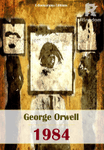
"1984" est un roman philosophique et d’anticipation publié en 1949, dans lequel Orwell dessine un monde totalitaire dans lequel les idéologies ont triomphé de l’individu.L’histoire se passe à Londres en 1984. Le monde est divisé en trois grandes ères géopolitiques en guerre : Eurasia, Estasia et Océania, toutes totalitaires, dirigés par des partis communistes qui se rêvaient au départ agents de libération du prolétariat. Le personnage principal, Winston Smith, travaille au Ministère de la Vérité, où il révise l’histoire pour la rendre adéquate à la version du Parti. Smith est un donc personnage lucide sur les manipulations opérées par le Parti, mais il dissimule ses opinions.Smith décrit la société qui l’entoure : la délation généralisée, la négation du s**e et de toute sensualité, la police de la pensée et de la langue, et surtout la surveillance de Big Brother, un système de caméra, réduisent l’individu à néant et l’isolent. Mais la rencontre avec une jeune femme, Julia, le pousse à transgresser les règles du parti : ils font l’amour et rêvent à un soulèvement de la population. Trahi par un de leurs « amis » (O’ Brien), ils sont arrêtés, torturés et rééduqués..."1984" est un roman politique dirigés contre les régimes communistes naissants au début des années 50, et à destination des lecteurs de l’Ouest. Orwell dépeint une société totalitaire, la réalisation la plus extrême qu’on puisse imaginer d’un gouvernement moderne. Le titre du roman indique qu’Orwell voit une possibilité historique l’avènement d’un tel monde.La technique est vue comme symbole de la domination politique, notamment au service de la manipulation psychologique. Big Brother est introduit dans chaque maison et appartement : spéhère publique et privée sont ainsi fusionnées. Les enfants sont élevés pour espionner et dénoncer leurs parents et la sexualité est reprimée car le désir est vu comme un témoignage de l’individualité. En sus de la manipulation mentale, le Parti exerce un contrôle physique de la population : même un tic facial peut provoquer une arrestation. Les individus effectuent tous un travail harassant pour maintenir la population dans un état de fatigue extrême, ce qui accroît leur niveau d’obéissance. La t*****e est également une pratique généralisée, signe que le corps appartient à l’Etat. L’histoire, de même, est contrôlée puisque le Parti réécrit les archives.
-
11. Keep The Aspidistra Flying

"Keep The Aspidistra Flying" is a 1936 novel by George Orwell. The book is a social critique set in 1930s London. The story revolves around the protagonist, Gordon Comstock, who fantasises about defying the worship of money and status, and how, in his attempt to escape these vices, he creates a rather dismal life for himself.George Orwell wrote "Keep the Aspidistra Flying" in 1934/35 while working at a bookshop in Hampstead and it was published in April 1936, just a few months before he left to fight in the Spanish Civil War. It is a novel of its time, capturing something of the ideological conflict, sociological concern, and economic distrust which so characterised the 1930s.
-
12. La ferme des animaux
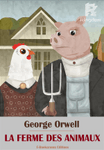
"La ferme des animaux" est un roman de George Orwell publié en 1945. Ce roman est un des plus célèbre du XXème siècle. L'histoire se passe dans une ferme d'Angleterre. Les animaux de la ferme du Manoir, exploités par les hommes, décident de se révolter suite au discours du cochon Sage l'Ancien, doyen de l'exploitation. Après sa mort, les cochons Napoléon et Boule de Neige mènent la révolte et chassent les fermiers.Ils organisent alors une ferme gérée par les animaux eux-mêmes. Puis, l'intellectuel Boule de Neige finit par être chassé par son rival Napoléon, qui fait de lui un traître, et mène la ferme d'une main de fer...Le contexte de l'histoire permet de faire un parallèle avec la Révolution Russe.La force de ce roman réside dans la dénonciation implicite – mais très claire – de tout régime autoritaire par le biais d'un humour souvent noir. Le peuple non instruit est présenté comme une masse faible, aisément manipulable (personnages des moutons) et impuissante.L'auteur ne laisse entrevoir aucun espoir de sortie de ce régime qui accable le peuple.
-
14. Coming Up For Air

Coming Up for Air is a novel by George Orwell, first published in June 1939, shortly before the outbreak of World War II. It combines premonitions of the impending war with images of an idyllic Thames-side Edwardian era childhood. The novel is pessimistic, with its view that speculative builders, commercialism and capitalism are killing the best of rural England, "everything cemented over", and there are great new external threats.
